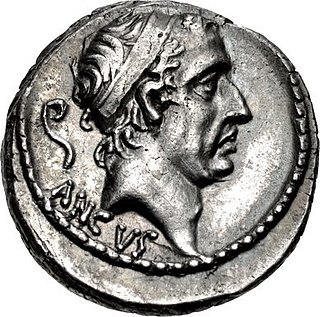
Ancus Marcius was the legendary fourth king of Rome, who traditionally reigned 24 years. Upon the death of the previous king, Tullus Hostilius, the Roman Senate appointed an interrex, who in turn called a session of the assembly of the people who elected the new king. Ancus is said to have ruled by waging war as Romulus did, while also promoting peace and religion as Numa Pompilius did.
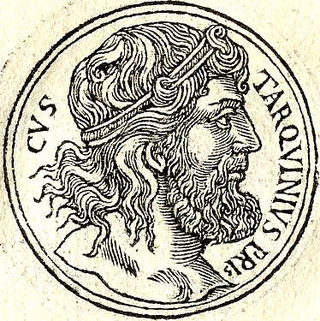
Lucius Tarquinius Priscus, or Tarquin the Elder, was the legendary fifth king of Rome and first of its Etruscan dynasty. He reigned for thirty-eight years. Tarquinius expanded Roman power through military conquest and grand architectural constructions. His wife was the prophetess Tanaquil.

Lucius Tarquinius Superbus was the legendary seventh and final king of Rome, reigning 25 years until the popular uprising that led to the establishment of the Roman Republic. He is commonly known as Tarquin the Proud, from his cognomen Superbus.

Servius Tullius was the legendary sixth king of Rome, and the second of its Etruscan dynasty. He reigned from 578 to 535 BC. Roman and Greek sources describe his servile origins and later marriage to a daughter of Lucius Tarquinius Priscus, Rome's first Etruscan king, who was assassinated in 579 BC. The constitutional basis for his accession is unclear; he is variously described as the first Roman king to accede without election by the Senate, having gained the throne by popular and royal support; and as the first to be elected by the Senate alone, with support of the reigning queen but without recourse to a popular vote.

Lucius Junius Brutus was the semi-legendary founder of the Roman Republic, and traditionally one of its first consuls in 509 BC. He was reputedly responsible for the expulsion of his uncle the Roman king Tarquinius Superbus after the suicide of Lucretia, which led to the overthrow of the Roman monarchy. He was involved in the abdication of fellow consul Tarquinius Collatinus, and executed two of his sons for plotting the restoration of the Tarquins.
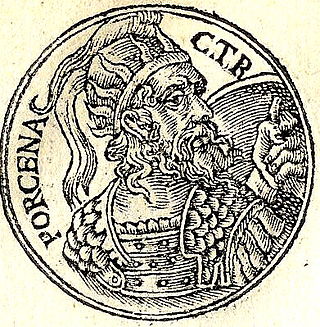
Lars Porsena was an Etruscan king (lar) known for his war against the city of Rome. He ruled over the city of Clusium. There are no established dates for his rule, but Roman sources often place the war at around 508 BC.
The Rutuli or Rutulians were an ancient people in Italy. The Rutuli were located in a territory whose capital was the ancient town of Ardea, located about 35 km southeast of Rome.
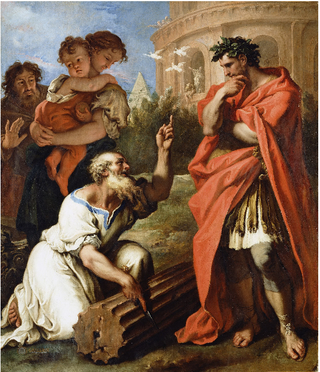
The gens Tarquinia was a plebeian family at ancient Rome, usually associated with Lucius Tarquinius Priscus and Lucius Tarquinius Superbus, the fifth and seventh Kings of Rome. Most of the Tarquinii who appear in history are connected in some way with this dynasty, but a few appear during the later Republic, and others from inscriptions, some dating as late as the fourth century AD.
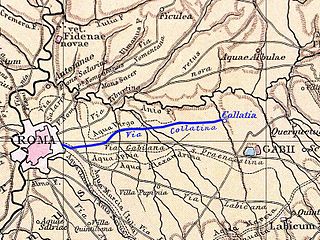
Collatia was an ancient town of central Italy, c. 15 km northeast of Rome by the Via Collatina.
Demaratus, frequently called Demaratus of Corinth, was the father of Lucius Tarquinius Priscus, the fifth King of Rome, the grandfather or great-grandfather of Lucius Tarquinius Superbus, the seventh and last Roman king, and an ancestor of Lucius Junius Brutus and Lucius Tarquinius Collatinus, the first consuls of the Roman Republic.

Sextus Tarquinius was one of the sons of the last king of Rome, Lucius Tarquinius Superbus. In the original account of the Tarquin dynasty presented by Fabius Pictor, he is the second son, between Titus and Arruns. However, according to Livy and Dionysius of Halicarnassus, he was either the third or first son, respectively. According to Roman tradition, his rape of Lucretia was the precipitating event in the overthrow of the monarchy and the establishment of the Roman Republic.
Crustumerium was an ancient town of Latium, on the edge of the Sabine territory, near the headwaters of the Allia, not far from the Tiber.

Lucius Tarquinius Ar. f. Ar. n. Collatinus was one of the first two consuls of the Roman Republic in 509 BC, together with Lucius Junius Brutus. The two men had led the revolution which overthrew the Roman monarchy. He was forced to resign his office and go into exile as a result of the hatred he had helped engender in the people against the former ruling house.
Arruns Tarquinius was the younger son of Demaratus of Corinth, who migrated to the Etruscan city of Tarquinii in the seventh century BC. He died shortly before his father, leaving his wife pregnant. When Demaratus died, he left no inheritance for his grandson, also named Arruns, who was thus born into poverty, although Demaratus had been wealthy. The child came to be called Egerius, meaning "the needy one."

Arruns Tarquinius, commonly called Egerius, was a member of the royal family of early Rome.

Spurius Lucretius Tricipitinus is a semi-legendary figure in early Roman history. He was the first Suffect Consul of Rome and was also the father of Lucretia, whose rape by Sextus Tarquinius, followed by her suicide, resulted in the dethronement of King Lucius Tarquinius Superbus, therefore directly precipitating the founding of the Roman Republic. It is believed that Lucretius and his accomplishments are at least partly mythical and most ancient references to him were penned by Livy and Plutarch.
Medullia was a town in ancient Latium, Italy.
Corniculum was an ancient town in Latium in central Italy.
Ficulea was an ancient town in Latium in central Italy.
The Roman–Sabine wars were a series of wars during the early expansion of ancient Rome in central Italy against their northern neighbours, the Sabines. It is commonly accepted that the events pre-dating the Roman Republic in 509 BC are semi-legendary in nature.











